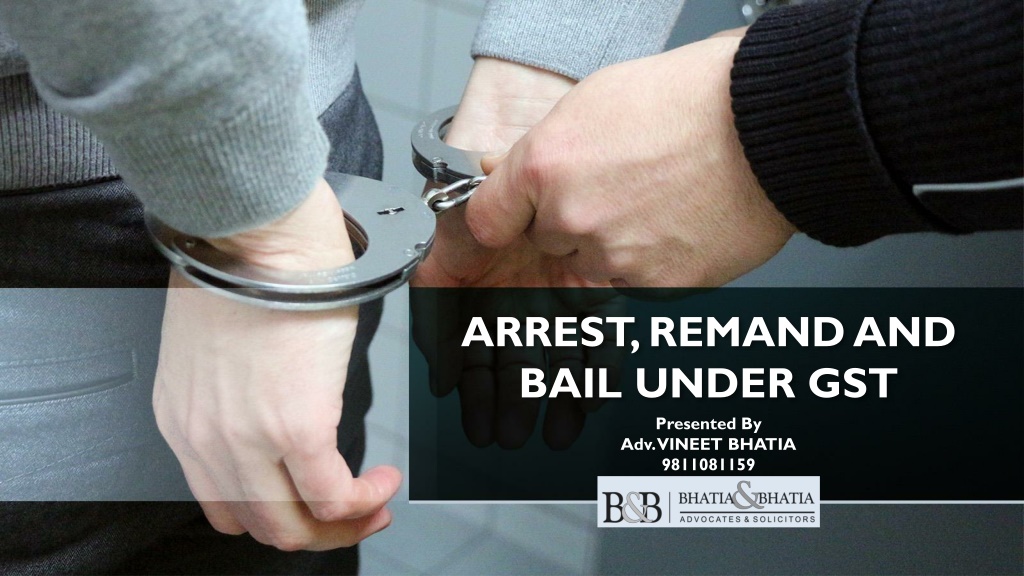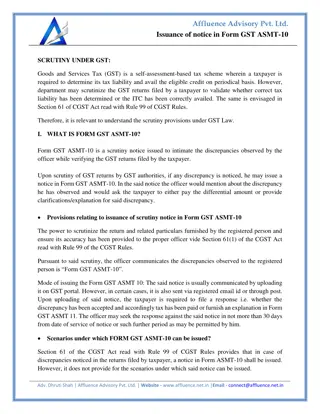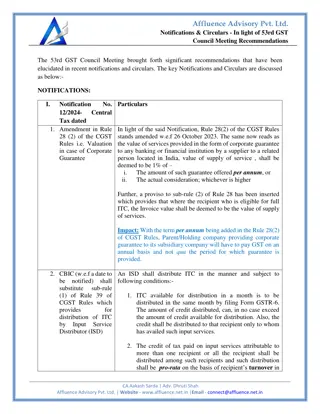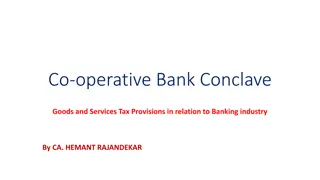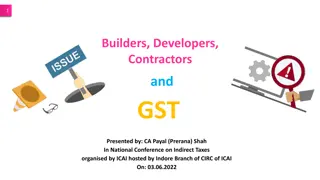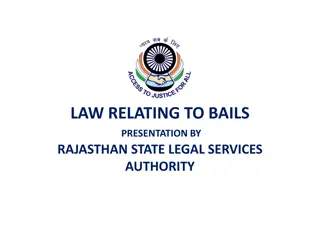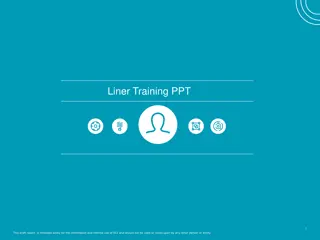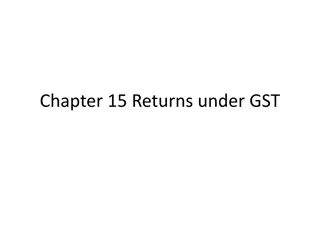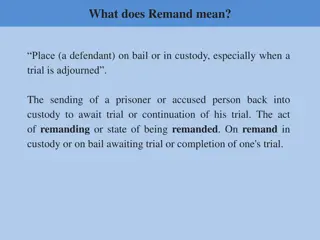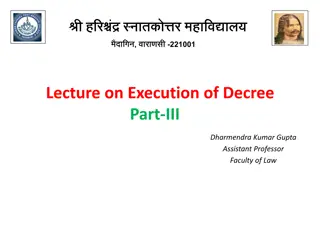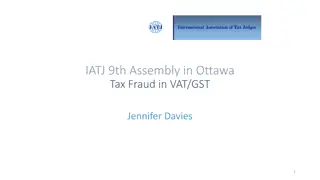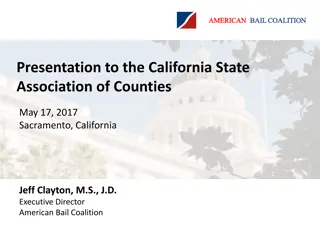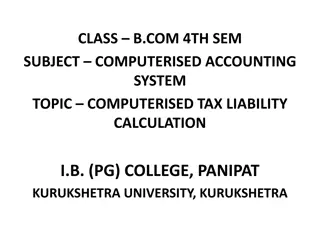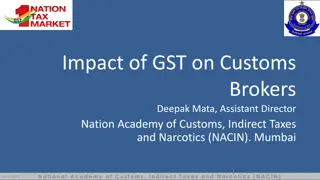Understanding Arrest, Remand, and Bail under GST by Adv. Vineet Bhatia
This presentation by Adv. Vineet Bhatia covers the meanings of remand, different offenses under GST such as evasion of tax, wrongful availment of input tax credit, and obstructing officers, and the procedures related to arrest, bail, and anticipatory bail in the context of GST violations.
Download Presentation

Please find below an Image/Link to download the presentation.
The content on the website is provided AS IS for your information and personal use only. It may not be sold, licensed, or shared on other websites without obtaining consent from the author. Download presentation by click this link. If you encounter any issues during the download, it is possible that the publisher has removed the file from their server.
E N D
Presentation Transcript
ARREST, REMAND AND BAIL UNDER GST Presented By Adv. VINEET BHATIA 9811081159
AGENDA FOR DISCUSSION MEANING OF REMAND OFFENCES UNDER GST ARREST BAIL ANTICIPATORY BAIL NON BAILABLE OFFENCES BAILABLE OFFENCES REGULAR BAIL
OFFENCES UNDER GST [Section 132] Whoever commits, or causes to commit and retain the benefits arising out of, any of the following offences, namely: (a) supplies any goods or services or both without issue of any invoice, in violation of the provisions of this Act or the rules made thereunder, with the intention to evade tax; (b) issues any invoice or bill without supply of goods or services or both in violation of the provisions of this Act, or the rules made thereunder leading to wrongful availment or utilisation of input tax credit or refund of tax; (c) avails input tax credit using the invoice or bill referred to in clause (b) or fraudulently avails input tax credit without any invoice or bill; (d) collects any amount as tax but fails to pay the same to the Government beyond a period of three months from the date on which such payment becomes due;
OFFENCES UNDER GST [Section 132] Whoever commits, or causes to commit and retain the benefits arising out of, any of the following offences, namely: (e) evades tax, or fraudulently obtains refund and where such offence is not covered under clauses (a) to (d); (f) falsifies or substitutes financial records or produces fake accounts or documents or furnishes any false information with an intention to evade payment of tax due under this Act; (g) obstructs or prevents any officer in the discharge of his duties under this Act; (h) acquires possession of, or in any way concerns himself in transporting, removing, depositing, keeping, concealing, supplying, or purchasing or in any other manner deals with, any goods which he knows or has reasons to believe are liable to confiscation under this Act or the rules made thereunder;
OFFENCES UNDER GST [Section 132] Whoever commits, or causes to commit and retain the benefits arising out of, any of the following offences, namely: (i) acquires possession of, or in any way concerns himself in transporting, removing, depositing, keeping, concealing, supplying, or purchasing or in any other manner deals with, any goods which he knows or has reasons to believe are liable to confiscation under this Act or the rules made thereunder; (j) tampers with or destroys any material evidence or documents; (k) fails to supply any information which he is required to supply under this Act or the rules made thereunder or (unless with a reasonable belief, the burden of proving which shall be upon him, that the information supplied by him is true) supplies false information; or (l) attempts to commit, or abets the commission of any of the offences mentioned in clauses (a) to (k) of this section,
OFFENCES UNDER GST 132(1)(b) 132(1)(c) 132(1)(d) 132(1)(a) Issues any Invoice or Bill. Avails such invoice or Bill referred to in clause (b) ITC using Collects any amount as tax but fsails to pay the same Government. Supplies services. goods or to the without supply of goods or services without issue of any invoice leading availment or utilisation of input tax credit or refund of tax to wrongful with intent to evade tax
PUNISHMENT FOR OFFENCES NATURE OF OFFENCE PUNISHMENT In cases where the amount of tax evaded or the amount of input tax credit wrongly availed or utilised or the amount of refund wrongly taken exceeds five hundred lakh rupees. [Above 5 Crores] Five Years and with fine In cases where the amount of tax evaded or the amount of input tax credit wrongly availed or utilised or the amount of refund wrongly taken exceeds two hundred lakh rupees but does not exceed five hundred lakh rupees. [Above 2 Crores but less than 5 Crores] Three Years and with fine In the case of any other offence where the amount of tax evaded or the amount of input tax credit wrongly availed or utilised or the amount of refund wrongly taken exceeds one hundred lakh rupees but does not exceed two hundred lakh rupees [Above 1 Crore but less than 2 Crores] One Year and with fine In cases where he commits or abets the commission of an offence specified in clause (f) or clause (g) or clause (j) Six Months and with fine
PUNISHMENT FOR SECOND OFFENCE NATURE OF OFFENCE PUNISHMENT Where any person convicted of an offence under this section is again convicted of an offence under this section, then, he shall be punishable for the second and for every subsequent offence Five Years and with fine
NATURE OF OFFENCE [Section132(4)] Section 132(4) : Notwithstanding anything contained in the Code of Criminal Procedure, 1973, all offences under this Act, except the offences referred to in sub-section (5) shall be non-cognizable and bailable.
NATURE OF OFFENCE [Section 132(5)] Sr. No. Offence Quantum Punishment Bailable or Non-Bailable Any Offence specified in Section 132(1) (a) or (b) or (c) or (d) of CGST Act, 2017. Tax of Rs. 5 Crores and above 1. 5 years Cognizable and Non-Bailable Any Offence specified in Section 132(1) (a) or (b) or (c) or (d) of CGST Act, 2017. Tax of Rs. 2 Crores and above but below Rs. 5 Crores 2. 3 years Cognizable and Bailable
POWER TO ARREST UNDER GST [Section 69] (1) Where the Commissioner has reasons to believe that a person has committed any offence specified in clause (a) or clause (b) or clause (c) or clause (d) of sub-section (1) of section 132 which is punishable under clause (i) or (ii) of sub-section (1), or sub-section (2) of the said section, he may, by order, authorise any officer of central tax to arrest such person. (2) Where a person is arrested under sub-section (1) for an offence specified under sub-section (5) of section 132, the officer authorised to arrest the person shall inform such person of the grounds of arrest and produce him before a Magistrate within twenty four hours. (3) Subject to the provisions of the Code of Criminal Procedure, 1973 (2 of 1974), (a) where a person is arrested under sub-section (1) for any offence specified under sub-section (4) of section 132, he shall be admitted to bail or in default of bail, forwarded to the custody of the Magistrate; (b) in the case of a non-cognizable and bailable offence, the Deputy Commissioner or the Assistant Commissioner shall, for the purpose of releasing an arrested person on bail or otherwise, have the same powers and be subject to the same provisions as an officer-in-charge of a police station.
MEANING OF REASONS TO BELIEVE In the case of Crompton Greaves Ltd. v State of Gujarat 120 STC 510 the court observed that these words suggest that belief must be that of honest and reasonable person based upon reasonable grounds, and that the commissioner may act under this section on direct or circumstantial evidence and not on mere suspicion, gossip or rumour. The powers under the present sections are wide but not plenary. The words of the section are reason to believe and not reason to suspect . The word believe is a much stronger word than suspect . There must be material based on which alone, the authority could form its opinion that a person has committed any offence as specified under clauses (a) to (d) of section 132 and it is necessary to arrest such person for the alleged offence. The existence of relevant material is a pre-condition to the formation of opinion. The use of word 'may' indicates not only the discretion, but an obligation to consider that a necessity has arisen to arrest the person concerned alleged to have committed any offence as specified under section 132. Therefore, the opinion to be formed by the Commissioner cannot be on imaginary ground, wishful thinking, howsoever laudable that may be. Such a course is impermissible in law. Vimal Yashwantgiri Goswami v. State of Gujarat [2021] 84 GSTR 347 (Guj)
MEANING OF REASONS TO BELIEVE The stipulation of the Commissioner to have reason to believe is of utmost importance in section 69(1). Section 26 of the Indian Penal Code defines the term 'reason to believe'. It means a person is said to have 'reason to believe' a thing, if he has sufficient cause to believe that thing but not otherwise. 'Reason to believe' is a very subjective phrase and may vary in circumstances of each case. 'Reason to believe' consists of two words 'reason' and 'to believe'. The word 'reason' means cause or justification and the word 'believe' means to accept as true or to have faith in it. Therefore, there must be justification for it and belief is the result of the mental exercise based on information received. The words 'reason to believe' contemplate an objective determination based on intelligence, care and deliberation involving judicial review as distinguished from a purely subjective consideration. The power conferred upon the authority under section 69 for arrest could be termed as a very drastic and far-reaching power. Such power should be used sparingly and only on substantive weighty grounds and reasons. Vimal Yashwantgiri Goswami v. State of Gujarat [2021] 84 GSTR 347 (Guj)
REASONS TO BELIEVE NEED NOT BE COMMUNICATED Reason to believe in Section 69 ibid need not be recorded in authorisation if recorded in file. - Section 69(1) of the CGST Act, 2017 specifically uses the words reasons to believe , in contrast to the words reasons to be recorded appearing in Section 41A(3) of Cr.P.C., we think that it is enough if the reasons are found in the file, though not disclosed in the order authorizing the arrest. P. V. Ramanna Reddy Vs UOI 2019 (25) G.S.T.L.185 (Telangana)
POWER TO ARREST UNDER GST [Section 69] WHETHER REASONS TO BELIEVE HAS TO BE OF THE COMMISSIONER ? Section 2(24) : "Commissioner" means the Commissioner of central tax and includes the Principal Commissioner of central tax appointed under section 3 and the Commissioner of integrated tax appointed under the Integrated Goods and Services Tax Act; Section 5(3) : The Commissioner may, subject to such conditions and limitations as may be specified in this behalf by him, delegate his powers to any other officer who is subordinate to him. In Nathalal Maganlal Chauhan v. State of Gujarat[2020] 35 GSTL 145 (Guj) held that power under Section 69 can be delegated. The concept of delegatus non-potest delegare is not a rule of law. Contrary view in Deep Suresh Gadhecha Vs State of GujaratSCRLA 10436/2019 and in Valerius Industries Vs. State of Gujarat [2019] 109 taxmann.com 218 (Gujarat)
CONSTITUTIONAL VALIDITY OF SEC 69 AND SEC 132 Supreme Court in case of Devendra Dwivedi Vs Union of India[2021] 44 GSTL 225 (SC) declined to interfere under Article 32 of COI and relegated the Petitioner to High Court under Article 226 of COI to decide constitutional validity of Section 69 and Sec 132. In Dhruv Krishan Maggu Vs UOI [2021] 84 GST 791 (Delhi) the question was whether Sections 69 and 132 of CGST Act are arbitrary, unreasonable and being beyond the legislative competence of the Parliament are ultra vires the Constitution. HELD : The Goods and Services Tax is a unique tax, in as much as the power as well as field of legislation are to be found in a single article, i.e., Article 246A. The scope of article 246A is significantly wide as it grants the power to make all laws 'with respect to' goods and services tax. In fact, the power of arrest conferred by section69 is not a general power of arrest, but is restricted to certain offences which are specified under section 69 namely some of the offences covered under section 132 and the offences so specified are all offences relating to goods and services tax, consequently, the expression 'with respect to' goods and services tax used in article 246A, being a constitutional provision, must be given its widest amplitude and would include the power to enact criminal law with regard to goods and services tax. Even if it is assumed that power to make offence in relation to evasion of Goods and Services Tax is not to be found under article 246A, Then, the same can be traced to Entry 1 of List III. The term 'Criminal Law' used in the aforesaid Entry is significantly wide and includes all Criminal Laws except the exclusions
POWER TO ARREST UNDER GST [Section 69] WHETHER ARREST CAN BE DONE WITHOUT ADJUDICATION ? The High Court of Delhi in Make my trip (India) Pvt Ltd vs Union Of India & Ors 2016 SCC OnLine Del 4951 while examining the powers of Directorate General of Central Excise Intelligence of arrest, investigation and assessment of service tax under the provisions of the Finance Act, 1994 equated arresting before the completion of adjudication proceedings to putting the cart before the horse. The findings of the Delhi High Court were later affirmed by the Supreme Court in Union Of India & Ors vs Makemytrip (India) Pvt Ltd (2019) 11 SCC 765. The Madras High Court in Jayachandran Alloys (P.) Ltd. vs Superintendent of GST & Central Excise 2019 SCC OnLine Mad 3124 held that determination of excess credit as provided under Section 73, 74 of CGST is a pre-requisite for recovery and this recovery can only be initiated once the amount of excess credit has been quantified and determined in an assessment. The Court then concluded that the power to punish set out in Section 132 of the Act would stand triggered only once it is established that an assessee has committed an offence that has to necessarily be post-determination of the demand due from an assessee, that itself has to necessarily follow the process of an assessment.
POWER TO ARREST UNDER GST [Section 69] WHETHER ARREST CAN BE DONE WITHOUT ADJUDICATION ? In P. V. Ramanna Reddy Vs UOI 2019 (25) G.S.T.L. 185 (Telangana) held List of offences included Section 132(1) of Central Goods and Services Tax Act, 2017 have no co-relation to assessment Contention that prosecution can be launched only after completion of assessment is untenable SLP against this order dismissed. P.V. Ramana Reddy v. Union of India - 2019 (26) G.S.T.L. J175 (S.C.)] The matter is sub-judice before Hon ble Supreme Court three member Bench in UOI vs Sapna Jain SLP (Crl.) 4322-4344/2019.
PROCEDURE AFTER ARREST UNDER GST [Section 69] 69 (2) Where a person is arrested under sub-section (1) for an offence specified under sub-section (5) of section 132, the officer authorised to arrest the person shall inform such person of the grounds of arrest and produce him before a Magistrate within twenty four hours. Grounds of arrest (Arrest Memo) Arrest memo is a crucial component of legal procedure of arrest and if Magistrate finds that arrest memo is absent or improperly filled or bereft of necessary particulars, he should decline production of arrested person and thus, arrest memo is a key safeguard against illegal arrest Vimal Yashwantgiri Goswami v. State of Gujarat [2021] 84 GSTR 347 (Guj) Produce him before a Magistrate within 24 hours.
PROCEDURE AFTER ARREST UNDER GST [Section 69] Section 167. Procedure when investigation cannot be completed in twenty four hours. REMAND JUDICIAL CUSTODY POLICE CUSTODY
BAIL ANTICIPATORY BAIL BAIL AFTER ARREST Regular bail or post arrest bail is taken after the arrest., it is generally attached with certain conditions.. The provisions in law are laid out U/s 437 of Criminal Procedure Code, 1973. Anticipatory bail or pre arrest bail is taken prior to arrest. However, it becomes effective from the time of arrest. As the word anticipation itself means, it is in expectation of some sort of accusation by the applicant. The provisions in law are laid out U/s 438 of Criminal Procedure Code, 1973.
BAIL Arnab M. Goswami v. State of Maharashtra (AIR 2021 SC-1) The nature of the alleged offence, the nature of the accusation and the severity of the punishment in the case of a conviction; Whether there exists a reasonable apprehension of the accused tampering with the witnesses or being a threat to the complainant or the witnesses; The possibility of securing the presence of the accused at the trial or the likelihood of the accused fleeing from justice; The antecedents of and circumstances which are peculiar to the accused; Whether prima facie the ingredients of the offence are made out, on the basis of the allegations as they stand, in the FIR The significant interests of the public of the State and other similar considerations
DEFAULT BAIL Section 167(2) Cr. P.C. Right to default bail under the first proviso to Section 167(2) CrPC not a mere statutory right but a fundamental right. [Bikramjit Singh v. State of Punjab, 2020 SCC OnLine SC 824, decided on 12.10.2020]
Whether Bail granted once can be cancelled ? Delhi Administration Vs Sanjay Gandhi 1978 (2) SCC 411 Rejection of Bail when Bail is applied for is one thing and cancellation of Bail already granted is quite another. It is easier to reject a bail application in a non-bailable case than to cancel a bail already granted in such a case. Cancellation of Bail necessarily involves the review of decision already made and can by and large be permitted only if, by reasons of supervening circumstances, it would be no longer conducive to a fair trial to allow the accused to retain his freedom during the trial.
THANK YOU Presented By Adv. VINEET BHATIA 9811081159 HEAD OFFICE A-2, Saraswati Vihar, Delhi-110034. Ph. 42041267, 9811081159 bhatiav68@gmail.com, vineet@bnblegal.in BRANCH OFFICE N-144, Greater Kailash-I, New Delhi -110048. Ph: 46536490, 29241260,98-110-81159
